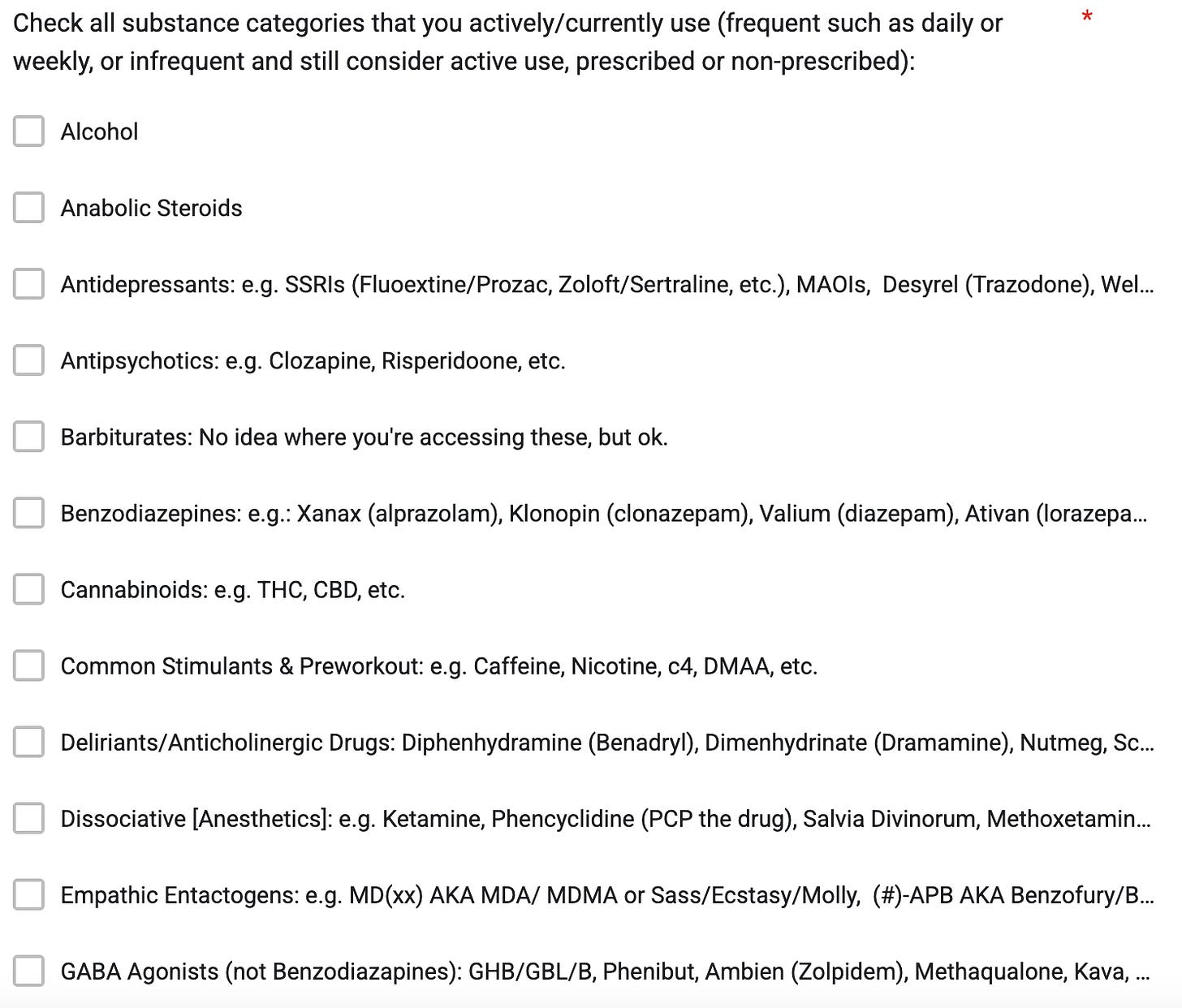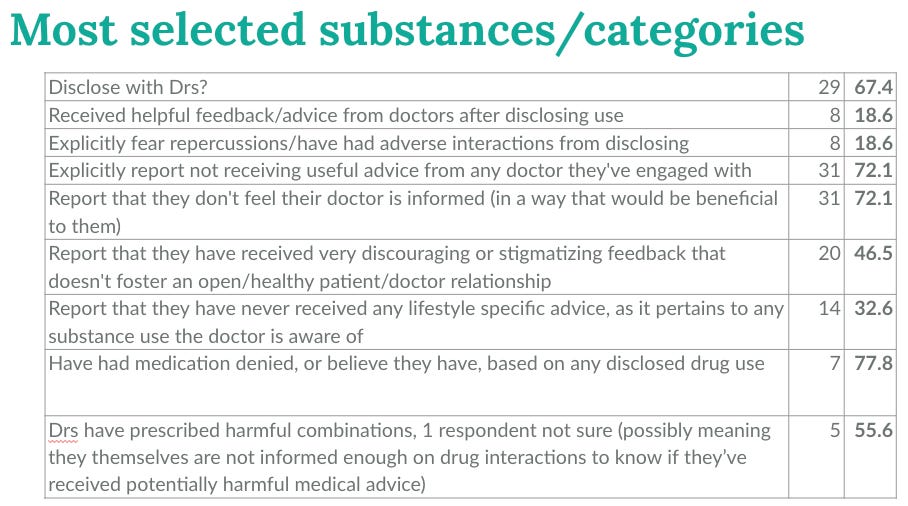Transgender Day of Visibility Factsheet 2025
The most information you're going to find on TGNC PWUD most likely
Each year on March 31st, the world observes Transgender Day of Visibility (TDOV) to raise awareness about transgender people. It is a day to celebrate the lives and contributions of trans people, while also drawing attention to the poverty, discrimination, and violence the transgender and gender-nonconforming (TGNC) community faces. We recognize that gender is a spectrum. This data includes men, women, non-binary, and other folks within that spectrum.
Here is a non-exhausting list of datapoints that I’ll be referencing that shows many stressors of being TGNC and/or a PWUD (person who uses drugs)
Impact of the COVID-19: Pandemic respondents were asked questions about their experiences with the COVID-19 pandemic to determine how it impacted the ways in which they move through the world and interact with others.
Most respondents reported that, in the last 12 months, they went out in public places (such as a grocery store, restaurant, or shopping mall) less than they did before the COVID-19 pandemic, including 27% who went out “somewhat less” than before, 33% who went out “a lot less” than before, and 1% that did not go out at all. Twenty-seven percent (27%) of respondents went out “about the same amount” as before the pandemic, 7% went out “somewhat more” than before, and 5% went out “a lot more” than before.
TGNC folks face instability meeting material needs and struggle to access adequate public health resources
Income, Employment, Workplace Experiences, and Housing Stability:
More than one-third (34%) of respondents were experiencing poverty.
The unemployment rate among USTS respondents was 18%.
More than one in ten (11%) respondents who had ever held a job said they had been fired, forced to resign, lost the job, or been laid off because of their gender identity or expression.
Nearly one-third (30%) of respondents had experienced homelessness in their lifetime.
General Health and Experiences with Health Care Providers:
More than one-quarter of respondents (28%) did not see a doctor when they needed to in the last 12 months due to cost.
Nearly one-quarter of respondents (24%) did not see a doctor when they needed to in the last 12 months due to fear of mistreatment.
Forty-four percent (44%) of respondents experienced serious psychological distress in the last 30 days (based on the Kessler 6 Psychological Distress Scale).
Drug use is more complex than many people perceive
This particular topic can have an entire post of its own. Maybe some day, I will write it. Until then, I’m pulling out some drug use information I’ve collected over the years from a very small survey I was working on that I’ve used to talk to health care providers and healthcare providers in training about working with PWUD patients:
Healthcare Physician/PWUD Relationship Survey
Total respondents - 43
Average age - 32

79.1% reported that they regularly interact with doctors (they have a PCP or they visit clinics as needed)
65.1% identified as lesbian, gay, bisexual, pansexual, or queer
27.9% do not have a primary care physician

Many respondents that reported that they use dissociatives (like Ketamine), GABA agonists (G drugs and Ambien, excluding benzos), and Benzodiazepines and reported that they use alcohol. When used together, these combinations of substances can cause potentiated side effects like vomiting and severe respiratory depression.
Some respondents that reported that they take antidepressants (ADs) (SSRIs or Wellbutrin, which is an NDRI) reported that they also use sedative/dissociative drugs, stimulants, and psychedelic drugs (psychedelic drugs in the phenethylamine like MDMA, 2C-B, and 4-MMC and tryptamine classes like LSD and psilocybin modulate many of the same receptors as ADs)

Most respondents do not disclose their non-prescribed drug use with healthcare physicians
When they did report non-prescribed drug use, the majority did not receive helpful advice (harm reduction) and the majority received unhelpful, negative/stigmatizing feedback
The majority say that their healthcare providers are not informed on drug use and in 55% of instances, received harmful health advice
The majority that have disclosed non-prescribed drug use have had negative repercussions such as
I gave respondents the option to go into additional details to explain some of their choices:
Will not risk [disclosing use] after 1 psych hounded me for months after I disclosed MJ use
I only disclose weed use, it’s approved. I’m afraid of my disabilities being neglected if I disclose anything else.
Told my doctor I smoked weed, once. My insurance went up in cost within a few months. So now I keep it to myself
Have disclosed marijuana use in the past, but was not given supportive advice.
Currently, my doctor asks -me- for a lot of this info, to give her additional information to give back to her other patients.
I feel they are informed on the mainstream drugs, but when it comes to some of the newer cathinones I am probably more informed.
I haven't been on a doctor's visit since my daily substance use started.
My psychiatrist offered to train my family doctor for free about harm reduction & how to safely prescribe suboxone, methadone, & Kadian. When I told my family doctor she got defensive and rude, said she doesn’t need to learn that because it’s not a part of her job.
Getting negative feedback from my doctors about substance use has always come with ideal lab results, blood pressure, heart rate, etc. so I’ve ignored their advice to stop.
I don't disclose any use because I know/fear there will be judgement and/or consequences
TGNC folks are an extremely vulnerable PWUD
Since there aren’t specific studies on trans populations’ drug use and compounding needs, I’m using 2024 data from NEXT Distro to represent some insightful findings. I did so in 2023 also.
In comparison between TGNC and non-trans people enrolled in the year 2024, the TGNC participants are:
442% more likely to have HIV
118% more likely to be BIPOC
95% more likely to be diagnosed with Cardiovascular Disease
69% more likely to have overdosed in the last year
43% more likely to have actively shared syringes with others in the last 30 days
40% more likely to be diagnosed with Hepatitis C
22% more likely to be homeless or unstably housed
5% more likely to have shared smoking supplies in the last 30 days
4% more likely to have actively reused their own syringes in the last 30 days
4% more likely to have witnessed an overdose in the last year
17% less likely to be accessing public benefits
5.6% of all naloxone orders sent by the NYC office went to TGNC folks
19% of TGNC participants enrolled in 2024 live in unfunded states
53% of non-TGNC participants enrolled in 2024 live in unfunded states
52% of all folks enrolled in Distro in 2024 live in unfunded states
For folks who received naloxone from the NYC office in 2024, TGNC requestors were 19% more likely than non-TGNC enrollees to not have health insurance or not know their health insurance status
In comparison between BIPOC and non-BIPOC participants enrolled in the year 2024, the BIPOC participants are:
170% more likely to be TGNC
Your Favorite Transgender Activists Used "Hard" Drugs, Sold Sex, and Pioneered Harm Reduction
Minority stress theory, developed by Ilan H. Meyer, posits that minority groups experience chronic stress due to their marginalized status in society. This stress can lead to negative health and mental health outcomes. Given this information, the logical thing to do to “help” marginalized communities such as the trans/gender non-conforming (TGNC) commun…
Oh god there was Quaaludes! And there were these uppers called “Black Beauties”. … “Red Bull gives you wings”? Fuck wings! Black Beauties put you in a jet airplane! Away we go! And get there quickly! - Miss Major Griffin





